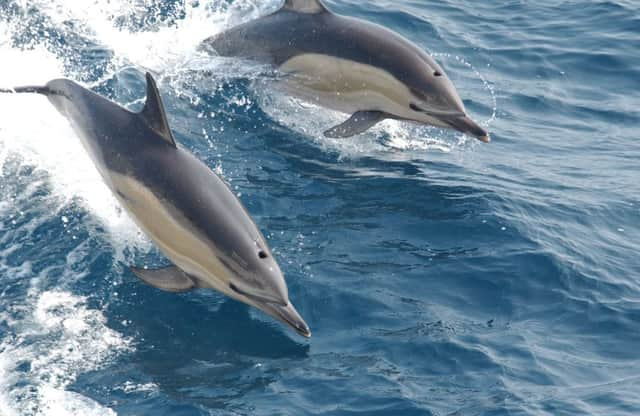Rise in Scottish dolphin sightings to be studied


Monitoring by Hebridean Whale and Dolphin Trust teams has seen the number of encounters with common dolphins increase by 68 per cent over the last 12 years in the Hebrides - but the reasons for the rise are still unclear.
Common dolphins come to the Hebrides in spring to take advantage of seasonal food stocks, travelling in large groups and sometimes forming “super-pods” of thousands of individuals.
Advertisement
Hide AdAdvertisement
Hide AdThe species, which are smaller than the area’s resident bottlenose dolphins, often approach boats and play in the wake, the trust said.
They were once rarely seen in the Hebrides, preferring warmer waters found further south.
But climate change is causing sea surface temperatures in the Hebrides to rise by around 0.5C a decade, and warmer water species appear to be colonising new areas further north or closer to shore, the trust said.
The shift north could be creating new opportunities for the common dolphins to find food in new areas, but may mean the species is competing for fish with other types of dolphin or seabirds.
Colder water species such as the white beaked dolphin could be forced to retreat further north, and while the trust said it had found no evidence of the white beaked dolphin being displaced, continued monitoring of the situation was needed.
The charity is calling for volunteers to join its research vessel Silurian to help conduct visual surveys, acoustic monitoring and identification of cetaceans, which include dolphins, whales and porpoises, as well as helping to run the yacht.
Dr Conor Ryan, sightings and strandings officer at Hebridean Whale and Dolphin Trust said: “An increase in common dolphins means that those wishing to encounter dolphins in the wild are in luck - but further research is needed to explain why this is happening, the extent to which it has been caused by human activity and the implications for other cetacean species.”
Kerry Froud, the trust’s biodiversity officer, added: “Our research expeditions depend on volunteers.
Advertisement
Hide AdAdvertisement
Hide Ad“In return they offer the opportunity of a lifetime to contribute to a better understanding of cetaceans and basking sharks, whilst enjoying the beautiful scenery of Scotland’s west coast and experiencing exhilarating sailing.”
• For more information about volunteering for the surveys, people can email [email protected], call 01688 302620 or visit www.hwdt.org
FOLLOW US
SCOTSMAN TABLET AND MOBILE APPS